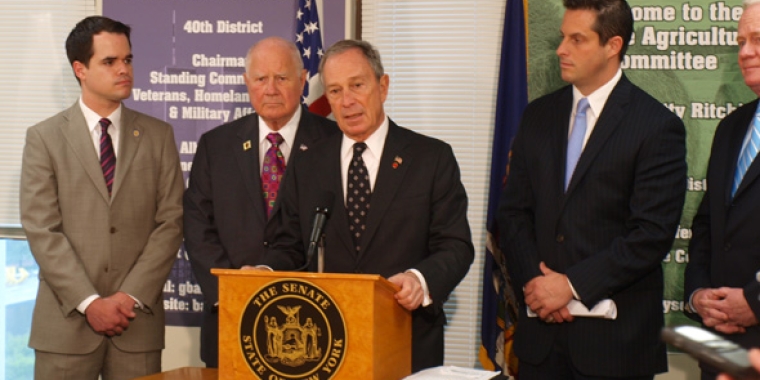
Chairman Ball and Mayor Bloomberg Stand Together on National Security
Greg Ball
May 17, 2011
-
ISSUE:
- Homeland Security

“Cuts will gut core programs, burden local agencies and create Swiss cheese approach”
Watch video of press conference
Senator Greg Ball (R, C, 40th District –Westchester/Putnam/Dutchess), Chairman of the Senate Veterans, Homeland Security, and Military Affairs Committee, was joined by Mayor Michael Bloomberg, and multiple members Senate Veterans, Homeland Security, and Military Affairs Committee, called upon House Speaker John Boehner and Senate Majority Leader Harry Reid to stop the proposed gutting of federal homeland security grant funding from $2.2 billion this year to $1 billion next year.
"This 50% cut, heading into the 10 year anniversary of 9-11, totaling over $186 million dollars is absolutely unacceptable. These cuts could effectively gut core programs, burden local agencies with insurmountable hurdles, and create a Swiss cheese approach where we would now be forced, by a penny wise and pound foolish federal government, to list dumb luck and prayer as the first defense in our Homeland Security efforts," stated Senator Ball.
Mayor Bloomberg has stated the reduction would cost the city of New York $100 million dollars. Since September 11th 2001, New York State has been the target of thirteen terrorist plots. Most recently, last Thursday two men were arrested by the NYPD who were planning on carrying out attacks on multiple synagogues in NYC. A key part of our success to preventing and thwarting these terror plots is due to the increased cooperation between local, state and federal law enforcement and intelligence agencies. Now is not the time for the federal government to step back from the partnership with state and local governments in defense of our nation.
Ball said, "The federal method of allocating homeland security dollars is suspect, inefficient and represents the bureaucratic equivalent of an internal national security risk. We cannot play games with our national security, and nearly a decade after 9-11 our soft underbelly, from our ports, borders, key infrastructure, the National Capital region to New York City and its suburbs, is still not sufficiently secure, or recoverable in many instances.”
“Last Thursday’s terror arrests again show how critical it is for Congress to allocate homeland security funds based on threats, not politics. New York City remains a prime target – we are the symbol of freedom and liberty the nation stands for. We already bear too much of the costs for protecting the City, and these proposed cuts would be a severe blow to our counter-terrorism efforts,” stated Mayor Michael R. Bloomberg.
Congressman Peter King (R-Seaford) said he is urging GOP leaders to boost the funding in the final bill."It's 10 days after Osama bin Laden is killed and we're all agreeing that the threat is higher, and they are cutting the grants 50 percent," King said. “This is a wrong decision in Congress. It’s totally wrong. I’ve made it clear to the speaker. I’ve made it clear to the majority leader,” King said. “This is not a party issue. I will stand with anyone—Republican or Democrat—to do all we can to reverse these cuts.”
"I am dismayed that New York continues to be shortchanged at the federal level when it comes to homeland security funding," said Senator Bill Larkin(R-C, Cornwall-on-Hudson). "At a time when our state needs to remain vigilant against possible terrorist activity, we should not have to worry about Washington reducing our funding for vital security measures. I join Chairman Ball in calling on Congress to rethink this terrible decision and ensure that New York receives the homeland security funding we need to keep our residents, visitors and landmarks safe and secure," said Larkin.
Senator Ball also cited the recently released documents showing Al Qaeda was plotting an attack on the U.S. rail system, possibly for the 10th anniversary of the 9/11 attacks. The documents found in the raid on Osama bin Laden’s compound should serve as a wake-up call about the continued threat to our nation’s homeland security. “These documents are a call to action about the importance of not only remaining vigilant, but a need to step-up security. Cutting funding, training, services and protections will simply mean opening ourselves up even more to the effectiveness and repercussions of a retaliatory attack ”
“In light of the death of Osama Bin Laden, it would be irresponsible and reckless to cut counter terrorism funding for New York City. As much as Bin Laden was a symbol for Al Qaeda's hatred of the West, New York City is a beacon of American resilience, fortitude and tolerance that should be vigilantly guarded,” stated Senator Eric Adams (D-Brooklyn).
On May 10th, Senator Ball released the preliminary report, from the first in a series of public hearings “To Determine the State of Security in New York, Ten Years after 9/11.” Chairman Ball cited the report as clear evidence that all funding is still desperately needed, “On April 8th we learned that security in New York at key locations and targets was either lax or nonexistent. Now we see some of those in federal government further seeking to destabilize any security advancements while obliterating the possibility of new progress on the issue of security. My goal is to now put the full weight of our committee and of this legislature behind securing our soft and exposed underbelly, this is not the time to be cutting funding, allowing our weaknesses to keep us vulnerable to attack."
Senator Ball and his colleagues on the Veterans, Homeland Security and Military Affairs Committee in a bi-partisan effort sent a letter to President Barack Obama, which summarized the findings of Ball’s recent Homeland Security Hearing, and pressed leaders to take the necessary actions to fix the problems immediately.
Ball’s letter specifically outlined the testimony of Robert Morris, Vice President, Port Authority Police Benevolent Association (PAPBA) and Michael O’Meara, Executive Vice President for the Metropolitan Transit Authority Police Benevolent Association (MTAPBA) who both spoke of serious communication and interoperability problems faced by some New York Police Officers. “The officer carries a radio on his belt but he might as well be wearing a brick,” said Morris to describe the current situation, where some communication devices work so poorly at various locations that officers are using their personal cell phones to communicate with each other. The men explained at the hearing that this creates a very serious safety hazard, not only to the members of the MTA Police Department, but also to the millions of riders who use our system.
The letter cites the 9/11 Commission Report recommendations that “high-risk urban areas such as New York City and Washington, D.C., should establish signal corps units to ensure communications connectivity between and among civilian authorities, local first responders, and the National Guard.” As well, that federal funding for emergency preparedness be based, “solely on risks and vulnerabilities, putting new York and Washington, D.C. at the top of the current list. Such assistance should not remain a program for general revenue sharing or pork-barrel spending.”
Attached below is Senator Ball’s letter to President Obama
The information for the next installment of Chairman Ball’s series of public hearings “To Determine the State of Security in New York, Ten Years after 9/11,” follows:
What: Public hearing “To Determine the State of Security in New York, Ten Years after 9/11”
When: June 15th
Where: Hearing Room A
LOB
Albany NY, 12247
Share this Article or Press Release
Newsroom
Go to NewsroomBill Nelson
May 16, 2014

Alana Sweeny
May 13, 2014

Earth Day 2014 Poster Contest: District 40
April 17, 2014
Thanksgiving Essays and Contributions
December 6, 2013
